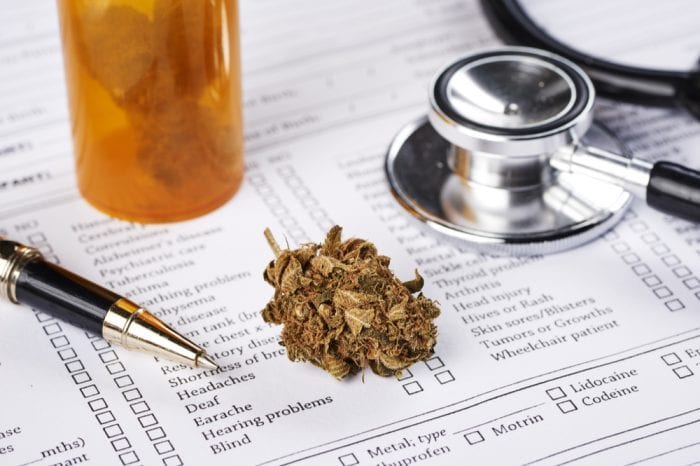A patient’s right to choose can definitely be limited when it comes to cannabis, and not just by legalities.
Unlike most pharmaceuticals on the market, cannabis is a patient-driven medicine. Without the anecdotal evidence and continuing push for its legalization from patients across the globe, pharmaceutical companies wouldn’t have bothered researching and testing medical cannabis. In other words, grassroots, patient-led movements are responsible for the increasing use of the plant. People seeking alternatives adopted cannabis treatment, even where the plant remains illegal. This bottom up adoption of a “new” medicine has created quite the puzzle for medical ethics.
The medical ethics issues swirling around cannabis are multi-layered. How do physicians work with medicine that hasn’t gone through the usual rigmarole of clinical study? How do they prescribe a medication when, in some places, it hasn’t even been legalized? What about patients’ right to choose their own therapy, or a physician’s mandate to do no harm? What role does duty of care play?

Prescribing a Substance Around the Law
Cannabis is still illegal at the federal level in the US, regardless of its status at the state level. As a result, in the thirty-three states where medical cannabis is legal, physicians must provide a recommendation for its use rather than a prescription. Once a patient has a doctor’s recommendation they can apply for a medical cannabis card.
According to the latest views of the American Medical Association (AMA), the current system for medical cannabis is a problem. A physician must act in the best interests of the patient. If a patients’ best interest is to avoid the use of prescription pharmaceuticals, and instead begin a treatment regime with cannabis, what position does it place the doctor in?
The AMA issued a statement discussing the issue of legality versus ethics in medicine. According to the AMA, laws and ethical values follow the same general course. However, sometimes the ethical option is not the legal option. The institution explains that in these cases “the law mandates unethical conduct. In general, when physicians believe a law is unjust, they should work to change the law. In exceptional circumstances of unjust laws, ethical responsibilities should supersede legal obligations.”
Quality of Life and Cannabis
Another ethical issue which is often surfaces around the topic of medical cannabis concerns quality of life. A physician is bound to “do no harm” in their course of treatment; their main concern should always be a patient’s quality of life. But for many conventional therapies, the side effects of the medicine are sometimes as bad as the disease.
Medical cannabis and especially the non-intoxicating components like cannabidiol (CBD), have repeatedly been shown to have a relatively better safety profile than their conventional counterparts. In these cases, does a physician prescribe a compound with mild side effects and little clinical study, or the harsher yet more heavily researched conventional medication? It’s easy to see the ethical dilemma certain patients and situations may create for a physician.
A Patient’s Right to Choose
In the physician-patient relationship, the patient has autonomy over their treatment, according to the medical code of ethics. It’s up to the patient to determine which treatments they wish to undergo. As a typical example, this is the reason some elderly patients forgo gruelling chemotherapy treatments following a cancer diagnosis. If they weigh the costs and the benefits of chemotherapy, they may determine the risks are too high for little return so late in life.

While it’s ultimately the doctor’s responsibility to present all available options, including risk analysis, it is the patient who must choose the course of action. This creates an issue for American doctors, especially those working in states without legal access to medical cannabis. Do they present the option of medical cannabis at all? Do they offer it with caveats?
What about if it is an option only one state over? Well, legally they really can’t introduce cannabis as an option. But they can answer questions to the best of their knowledge if a patient asks. Furthermore, if the patient chooses medical cannabis, what does the physician do if it’s not a legal option or there isn’t enough evidence to support it? These questions place the doctor between their medical code of ethics, the law, and even the available research.
The Lack of Clinical Study
A final issue clouding the ethical code of conduct around cannabis is the general lack of information. Pharmaceutical drugs come with concise guidelines about when and how to prescribe. Cannabis, on the other hand, doesn’t come with any guidelines. To make matters more complicated, most physicians haven’t learned about cannabis in a formal setting, and on top of that, everyone’s tolerance for cannabis is different. It depends on a patient’s reaction to THC and their history of cannabis consumption. Determining the best dose, method of ingestion, and cannabinoid ratio requires knowledge but unfortunately, most patients, especially those criminalized states, are reaching around in the dark to find the best way to treat with cannabis.
Can a medical professional in good conscience prescribe medicine that hasn’t been as thoroughly researched as another? Because of the ongoing legal issues, there isn’t the same level of medical research into cannabis as for other drugs on the market today.
The medical ethics around cannabis are by no means settled. Even in Canada, a country with federally approved medical and recreational cannabis, physicians battle with medical ethics. Docs must sorting through little clinical evidence. They must balance the patient’s right to choose and their duty of care. Further, most haven’t been formally trained on cannabis as a treatment. The only clear aspect of medical cannabis is that there are no clear answers about the medical ethics of it all.



